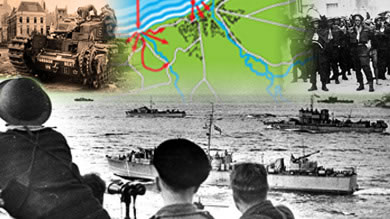Prisoner of War
The Dieppe Raid
Prisoner of War
Transcript
Description
Little could be done at the Dieppe hospital. As German Prisoners of War, the men were loaded into train boxcars for an overnight journey to a large hospital in Rouen, France for treatment by German doctors. Mr. Gorman’s friend, Ted Broadbent, accompanied him. He speaks of his friend’s kindness to the injured, refusing to tell anyone of his own injury which eventually resulted in Broadbent’s hospitalization in Germany.
Donald Gorman
Mr. Gorman was born June 23, 1921. His father was a stationary engineer at one of Windsor’s high schools and was a veteran of both the Boer War and the First World War. Mr. Gorman left school after achieving junior matriculation. He held jobs in a bakery, a fish market and as an apprentice mechanic at Remington-Rand typewriter factory in Windsor. After enlisting on September 16, 1939, he took his basic training in Windsor before being moved to Camp Borden for advanced training in June, 1940. Mr. Gorman went overseas with the Royal Hamilton Light Infantry Regiment and was involved in the Dieppe Raid.
Meta Data
- Medium:
- Video
- Owner:
- Veterans Affairs Canada
- Duration:
- 03:54
- Person Interviewed:
- Donald Gorman
- War, Conflict or Mission:
- Second World War
- Location/Theatre:
- Europe
- Battle/Campaign:
- Dieppe
- Branch:
- Army
- Units/Ship:
- Essex Scottish Regiment
- Rank:
- Lance-Corporal
- Occupation:
- Signalman
Related Videos
- Date modified:




